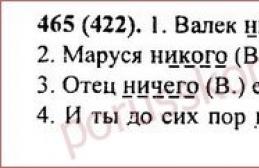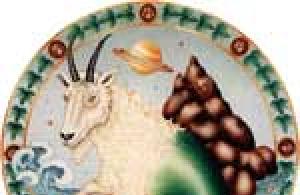Monument to those tortured during investigation,
shot in basements, killed
at stages and in camps - created.
L. Chukovskaya
The truth is well known: every era creates its own hero, who most fully embodies its problems, contradictions, and aspirations. Literature plays an important role in this. The great masters of words not only created their own literary heroes, carriers of the spirit of the times, but they themselves became rulers of thoughts for many generations. Therefore, we are talking about the era of A. Pushkin, F. Dostoevsky, L. Tolstoy, A. Blok.
The 20th century turned out to be extremely rich in events, leaders, and arbiters of destinies. Where are they, these idols of millions, now? The rapid movement of time erased from memory folk names many, only a few remain, among them Alexander Solzhenitsyn. How much effort has been made to make people forget this name! It's all in vain. A. Solzhenitsyn is forever “registered” in the history of Russia and its great literature.
Nowadays, literary scholars, politicians, philosophers are struggling with the question of who Solzhenitsyn is: a writer, publicist or public figure? I think that Solzhenitsyn is a phenomenon, an example of the harmonious unity of a writer’s talent, the wisdom of a thinker and the amazing personal courage of a patriot.
But how did a brilliant student of the Faculty of Physics and Mathematics at Rostov University, an active Komsomol member, grow into a great fighter against totalitarianism? Solzhenitsyn himself identified three milestones on the path of his civic development: war, camp, cancer.
Having passed the front roads from Orel to East Prussia, Solzhenitsyn was arrested and received eight years of forced labor camps. As soon as he was freed, finding himself in an eternal settlement, he fell ill and was forced to go to Tashkent, to an oncology clinic. But here, too, Solzhenitsyn turned out to be the winner. It is at this moment that he realizes his future fate: “I was not killed at the front, I did not die in the camp, I did not die of cancer in order to be able to write about the atrocities that have been happening in our country for decades.”
The camp theme is present in almost every work of Solzhenitsyn. However, his civic and literary feat was “The Gulag Archipelago,” which has the following dedication: “To everyone who didn’t have enough life to tell about it. And may they forgive me that I didn’t see everything, didn’t remember everything, didn’t guess everything.”
227 people sent Solzhenitsyn their memories of the Gulag. On behalf of these people and many others, living and dead, the writer speaks about those horrors that were later covered up with the quite decent words “cult of personality.”
“The Gulag Archipelago,” consisting of seven parts, covers all periods of the life of prisoners: arrest, prison, stage, camp, exile, liberation and much more about what we, the people, are talking about beginning of the XXI century, we can’t even guess.
But the work is powerful not only because of this factual material. Solzhenitsyn actively uses images of Christian culture here. The suffering of the prisoner, strung up on the rack, is compared to the suffering of the Son of God. But the author himself hears a girl crying in a neighboring women’s camp, left as punishment in the forty-degree frost. Helpless to help, he swears: “I promise this fire and you, girl: the whole world will read about it.” And behind these words there are others spoken by Jesus Christ to Mary: “It will be said in memory of her and what she did.”
Great Russian literature comes to the aid of the writer. He remembers the names of L. Tolstoy, F. Dostoevsky, A. Chekhov. With the name of Dostoevsky, who wrote about the tear of a lost child, the book includes the topic “The Gulag and Children.” It turns out that in 1934 the USSR adopted a decree according to which citizens over the age of twelve could be arrested and executed.
Remembering A.P. Chekhov, Solzhenitsyn writes: “If Chekhov’s intellectuals, who were all wondering what would happen in twenty to thirty years, had been told that in forty years there would be a torture investigation in Rus'..., all the heroes would have gone to a madhouse "
As a result of all this, the book creates a terrible image of Evil, which can be resisted only by maintaining the purity of the soul and moral principles, and the author himself acts as a prophet, the “verb” that burns our hearts.
And later, in the 70s, Solzhenitsyn would not forget about this for a minute. high role. The result of his fight against Evil will be expulsion. But even there, in distant Vermont, he felt a blood connection with Russia.
In 1994, Solzhenitsyn returned to his homeland. He dreamed of being useful to his people. What a pity that we were unable to hear and understand him, this great writer and faithful son of Russia!
Conceived in 1937 and completed in 1980, A.I. Solzhenitsyn's August the Fourteenth represents a significant milestone in the artistic coverage of the First World War. Critics have more than once noted its similarities with Leo Tolstoy's War and Peace. We agree...
Alexander Isaevich Solzhenitsyn was born in 1918 in Kislovodsk; His father came from a peasant family, his mother was the daughter of a shepherd, who later became a wealthy farmer. After high school Solzhenitsyn graduated from physics and mathematics in Rostov-on-Don...
PROGRESS OF THE LESSON I. Organizational stage II. Updating basic knowledge Problematic question ♦ tell us about the fate of the hero of the story “One Day in the Life of Ivan Denisovich”, his life values. Which of the heroes of Russian literature is spiritually close to Shukhov?...
A. I. Solzhenitsyn? the greatest writer of the 20th century, philosopher-life-builder, inspired defender of Russia. In his works he continues one of the central humanistic lines of Russian classical literature? idea moral ideal, internal...
Tale " Dead Souls"can rightfully be called best work Nikolai Vasilievich Gogol. According to V. G. Belinsky, all creative life writer before working on it was only a preface and preparation for this truly brilliant creation. "Dead Souls" are one of the most bright examples Gogol’s manner of depicting reality, because where else can one find such an accurate and truthful biography of Russia at that time. It’s not for nothing that many writers talk about the “Gogolian” movement in literature, calling N.V. Gogol the founder realistic direction in poetic art. N.V. Gogol’s own opinion about the purpose of a writer, or, in other words, an artist, is expressed in the words: “Who, if not the author, should tell the holy truth?” Let’s try to understand how N. justifies. V. Gogol his ideas about the artist, how he sees his fate and how his satirical heroes from characters in other comedies.
Like many other writers, N.V. Gogol directly addresses the reader through his lyrical digressions, in which he complains about the shortcomings of Russian reality, in particular, the lack of analogues of foreign words in the Russian language, and also justifies himself in advance and explains the meaning of all those moments that, in his opinion, may cause y. readers irritation and dissatisfaction. In one of his lyrical digressions, Gogol explains his views on the purpose of the artist. Here he writes that: “... it’s not that it’s hard that they will be dissatisfied with the hero, it’s hard that there is an irresistible confidence in the soul that readers would be happy with the same hero, the same Chichikov.” I think that in these words Gogol wanted to say that vice will not be ridiculed and presented to everyone, it will not be noticed. So who, if not a writer, should help people discover these vices, who better than him can ironically expose the reality around us? Perhaps now that so many have appeared critical literature, such a point of view would be very ambiguous.
After all, the opinion may arise that such abundance provokes rather than eradicates shortcomings. However, during the time of N.V. Gogol, who was, in fact, one of the first writers who dared to so directly ridicule the shortcomings of his time and who really succeeded like no one else, such a work as “Dead Souls” was simply invaluable in its its importance and necessity. Therefore, I cannot but agree with the above words of the writer, as well as with his further reasoning about the so-called “patriots”. N.V. Gogol, knowing that attacks from such people may arise, responds to them in advance. All the absurdity and ugliness of such people, “ardent patriots, until time calmly engaged in some philosophy or increments on the account of the sums of their dearly beloved fatherland, thinking not about not doing bad, but about not saying that they are doing something bad,” described by N.V. Gogol in a story about a strange family consisting of a “philosopher” father and a son, half-jokingly, half-seriously called by the author a Russian hero. It seems to me that this small episode, which cannot but cause a smile when read, once again confirms the idea previously expressed by N.V. Gogol.
After all, who, if not a person, who by nature has the gift of seeing what is not visible to others, who has good feeling humor and who knows how to succinctly express his thoughts, to engage in understanding the nature of such people... Now I would like to talk about what distinguishes N.V. Gogol from other satirical writers. N.V. Gogol does not describe his heroes fluently and superficially, like many of his predecessors, believing that this not only will not help him create his characters, but even on the contrary, with such an image he will not be able to achieve his plans.
This might interest you:
- I was called to sing of your suffering, Amazing the people with patience! And throw at least a single ray of consciousness onto the path that God leads you... N. A. Nekrasov V...
- Mikhail Bulgakov's novel "The Master and Margarita", on which the author worked before last day of his life, remained in his archive and was published in nineteen hundred...
- And why, in fact, shouldn’t Khlestakov be an “auditor”, a boss? After all, an even more incredible event could happen in another work of N. Gogol - the flight of the nose...
- What is Pechorin's tragedy? I look sadly at our generation! His future is either empty or dark, Meanwhile, under the burden of knowledge or doubt...
- Fonvizin’s satirical and dramatic successes are closely connected with his social and political activities “Life teaches only those who study it,” wrote V. Klyuchevsky and...
Rating entries
- - 15,559 views
- - 11,060 views
- - 10,623 views
- - 9,771 views
- - 8,698 views
News
Popular Essays
Features of teaching and raising children in a type V school The purpose of the special educational institution for children with disabilities (CHD),
“The Master and Margarita” by Mikhail Bulgakov is a work that pushed the boundaries of the novel genre, where the author, perhaps for the first time, managed to achieve an organic combination of the historical-epic,
Open lesson“Area of a curvilinear trapezoid” 11th grade Prepared by mathematics teacher Lidiya Sergeevna Kozlyakovskaya. MBOU secondary school No. 2 of the village of Medvedovskaya, Timashevsky district
Famous novel Chernyshevsky “What to do?” was consciously oriented towards the tradition of world utopian literature. The author consistently presents his point of view on
REPORT ON THE WEEK OF MATHEMATICS. 2015-2014 academic year year Objectives of the subject week: - increasing the level of mathematical development of students, expanding their horizons;
Exam essays
Organization of extracurricular activities in a foreign language Marina Viktorovna Tyutina, teacher French The article belongs to the section: Teaching foreign languages System
I want swans to live, and from white flocks the world has become kinder... A. DementyevSongs and epics, fairy tales and stories, stories and novels of Russians
“Taras Bulba” is not quite ordinary historical story. It does not reflect any precise historical facts, historical figures. It is not even known
In the story “Sukhodol” Bunin paints a picture of the impoverishment and degeneration of the Khrushchev noble family. Once rich, noble and powerful, they are going through a period
Russian language lesson in 4th "A" class
« A real writer the same as the ancient prophet: he sees more clearly than ordinary people"(A.P. Chekhov).
“A real writer is the same as an ancient prophet: he sees more clearly than ordinary people” (A.P. Chekhov). (Based on one or more works of Russian literature of the 19th century century)
“A poet in Russia is more than a poet,” this thought has long been familiar to us. Indeed, Russian literature, starting from the 19th century, became the bearer of the most important moral, philosophical, ideological views, and the writer began to be perceived as special person prophet. Pushkin already defined the mission of a real poet in exactly this way. In his programmatic poem, called “The Prophet,” he showed that in order to fulfill his task, the poet-prophet is endowed with very special qualities: the vision of a “frightened eagle,” hearing capable of listening to “the trembling of the sky,” a tongue similar to the sting of a “wise snake.” " Instead of an ordinary human heart, the messenger of God, the “six-winged seraphim,” preparing the poet for a prophetic mission, puts “a coal blazing with fire” into his chest cut by a sword. After all these terrible, painful changes, the chosen one of Heaven is inspired on his prophetic path by God himself: “Arise, prophet, and see, and listen, / Be fulfilled by my will...”. This is how the mission has been defined since then true writer, who brings to people the word inspired by God: he must not entertain, not give aesthetic pleasure with his art, and not even propagate any, even the most wonderful ideas; His job is to “burn people’s hearts with his words.”
How difficult the prophet’s mission was was already realized by the poet, who, following Pushkin, continued to fulfill the great task of art. His prophet, “mocked” and restless, persecuted by the crowd and despised by it, is ready to flee back to the “desert”, where, “keeping the law of the Eternal,” nature listens to his messenger. People often do not want to listen to the prophetic words of the poet; he sees and understands very well what many would not like to hear. But Lermontov himself, and those Russian writers who, after him, continued to fulfill the prophetic mission of art, did not allow themselves to show cowardice and abandon the difficult role of the prophet. Often suffering and sorrow awaited them for this; many, like Pushkin and Lermontov, died untimely, but others took their place. Gogol in lyrical digression from the UP chapter of the poem “Dead Souls” openly told everyone how difficult the path of a writer is, looking into the very depths of the phenomena of life and striving to convey to people the whole truth, no matter how unsightly it may be. They are ready not only to praise him as a prophet, but to accuse him of all possible sins. “And only when they see his corpse, / How much he did, will they understand, / And how he loved while hating!” This is what another Russian poet-prophet wrote about the fate of the writer-prophet and the attitude of the crowd towards him.
It may seem to us now that all these wonderful Russian writers and poets who make up the “golden age” Russian literature, have always been as highly revered as they are in our time. But even now recognized throughout the world as a prophet of future catastrophes and a harbinger of the highest truth about man, Dostoevsky only at the very end of his life began to be perceived by his contemporaries as greatest writer. Truly, “there is no prophet in his own country”! And, probably, now somewhere near us lives someone who can be called a “real writer”, like an “ancient prophet”, but do we want to listen to someone who sees and understands more than ordinary people, this is main question.
“A real writer is the same as an ancient prophet: he sees more clearly than ordinary people” (A.P. Chekhov). (Based on one or more works of Russian literature of the 19th century)
“A poet in Russia is more than a poet,” this thought has long been familiar to us. Indeed, Russian literature, starting from the 19th century, became the bearer of the most important moral, philosophical, ideological views, and the writer began to be perceived as a special prophet. Pushkin already defined the mission of a real poet in exactly this way. In his programmatic poem, called “The Prophet,” he showed that in order to fulfill his task, the poet-prophet is endowed with very special qualities: the vision of a “frightened eagle,” hearing capable of listening to “the trembling of the sky,” a tongue similar to the sting of a “wise snake.” " Instead of an ordinary human heart, the messenger of God, the “six-winged seraphim,” preparing the poet for a prophetic mission, puts “a coal blazing with fire” into his chest cut by a sword. After all these terrible, painful changes, the chosen one of Heaven is inspired on his prophetic path by God himself: “Arise, prophet, and see, and listen, / Be fulfilled by my will...”. This is how the mission of a true writer has since been defined, who brings people the word inspired by God: he must not entertain, not give aesthetic pleasure with his art, and not even propagate some, even the most wonderful ideas; His job is to “burn the hearts of people with words.”
How difficult the mission of the prophet was already realized by Lermontov, who, following Pushkin, continued to fulfill the great task of art. His prophet, “mocked” and restless, persecuted by the crowd and despised by it, is ready to flee back to the “desert”, where, “keeping the law of the Eternal,” nature listens to his messenger. People often do not want to listen to the prophetic words of the poet; he sees and understands very well what many would not like to hear. But Lermontov himself, and those Russian writers who, after him, continued to fulfill the prophetic mission of art, did not allow themselves to show cowardice and abandon the difficult role of the prophet. Often suffering and sorrow awaited them for this; many, like Pushkin and Lermontov, died untimely, but others took their place. Gogol, in a lyrical digression from the UP chapter of the poem “Dead Souls,” openly told everyone how difficult the path of a writer is, looking into the very depths of the phenomena of life and striving to convey to people the whole truth, no matter how unsightly it may be. They are ready not only to praise him as a prophet, but to accuse him of all possible sins. “And only when they see his corpse, / How much he did, will they understand, / And how he loved while hating!” This is what another Russian poet-prophet Nekrasov wrote about the fate of the writer-prophet and the attitude of the crowd towards him.
It may seem to us now that all these wonderful Russian writers and poets who make up the “golden age” of Russian literature have always been as highly revered as they are in our time. But even now recognized throughout the world as a prophet of future catastrophes and a harbinger of the highest truth about man, Dostoevsky only at the very end of his life began to be perceived by his contemporaries as the greatest writer. Truly, “there is no prophet in his own country”! And, probably, now somewhere near us lives someone who can be called a “real writer”, like an “ancient prophet,” but do we want to listen to someone who sees and understands more than ordinary people, this is the main question.
(No ratings yet)
Essays on topics:
- 15 years after Pushkin wrote the poem “Prophet”, Lermontov, whom many consider Pushkin’s successor, writes a new poem “Prophet” - his...
- A. S. Pushkin wrote the poem “Prophet” in 1826. This was the time of reprisals by the authorities against participants in the Decembrist uprising, many of...









